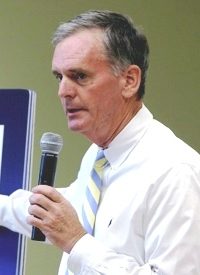
U.S. Sen. Judd Gregg, (R-N.H.), is insisting that the government obey the law, an idea some Washington insiders might find rather quaint in 21st century America. Gregg has taken sharp issue with President Obama’s plan to use money repaid by beneficiaries of the 2008 bailout of large financial institutions to fund a new program aimed at helping small businesses. Gregg, the ranking Republican on the Senate Budget Committee, helped write the Toxic Assets Relief Program law and the Granite State Republican argues the repayments should be used to bring down the national debt, as the law requires.
On Tuesday Obama was in Nashua, New Hampshire, Gregg’s birthplace, touting the plan to provide community banks with $30 billion in repaid TARP money to lend to small businesses to spur the growth of new jobs. Meanwhile, as reported in the New Hampshire Union Leader, Gregg was in Washington, grilling and literally yelling at the President’s budget chief. Peter Orszag, at a committee hearing in which Orszag spoke of how the planned diversion of the TARP money would benefit credit-hungry small businesses.
"No! No! No!" Gregg shouted. "You cannot make that statement with any legitimacy. You cannot make that statement." The senator insisted the law does not allow use of the money to fund another program. "The law is very clear, " he said. "The monies recouped from the TARP shall be paid into the general fund of the public debt. It’s not for a piggy bank because you’re concerned about lending to small businesses and you want to get a political event when you go out and make a speech in Nashua, New Hampshire." Upon further questioning by Gregg, Orszag said the administration would be seeking congressional approval for the new program.
"This is the law as it stands today," came Gregg’s retort. The exchange between Gregg and Orszag prompted Committee Chairman Kent Conrad, (D- N.D.), to gavel the session to order. But Conrad seemed to also question the wisdom, if not the legality, of a new $30 billion program at a time when the national debt is soaring dramatically and this year’s deficit alone is expected to be more than $1.5 trillion.
"I believe we are on an unsustainable course," Conrad said.
Congress passed the $700 billion TARP bill after the collapse in the financial industry in the fall of 2008, the final year of the George W. Bush administration. It was followed in early 2009 by the passage of the new Obama administration’s economic stimulus bill of nearly $800 billion. Gregg, who supported the bailout, initially accepted Obama’s nomination for Secretary of Commerce during the first few weeks of the new administration. He later withdrew, claiming irreconcilable differences with the administration over the stimulus bill.
At his "town hall" meeting in Nashua North High School, Obama told a friendly crowd of about 1,600 in the school gym that his plan for capitalizing community banks would create incentives for increased lending to small businesses.
"These are small, local banks that work most closely with our small businesses–that provide them their first loan, and watch them grow through good times and bad," the president said. New Hampshire’s junior senator, former Gov. Jeanne Shaheen, stood literally and figuratively by the president’s side in Nashua, saying she would lend her efforts to getting Senate approval of the plan.
But if the Obama administration were to divert the funds without congressional approval, it would have a handy precedent to cite from the previous administration. In December of 2008 the Senate killed a $14 billion rescue plan for the nation’s auto industry. Little more than a week later, President Bush announced the administration would lend $17.4 billion to Chrysler and General Motors.
Gregg on Monday called Obama’s new budget "fiscal insanity." But at Tuesday’s hearing, Orszag said the deficit for 2009 was already $1.3 trillion when Obama took office in January of last year and that the new president inherited what turned out to be a $10.6 trillion deficit over ten years. Obama’s spending plan will cut the deficits by $1.2 trillion over the next decade, he said.
Gregg, a former governor of New Hampshire, is on the last year of his third senate term and is not seeking reelection. During the presidency of George W. Bush, he was a key ally for many of the White House spending proposals, most notably as co-sponsor with Sen. Edward M. Kennedy of the education bill known as the No Child Left Behind Act, passed in 2001. Since the Constitution gives the federal government no role in education, Sen. Gregg may be described as a bit tardy in coming to the realization that the government should obey the law, including the highest law in the land — the Constitution of the United States.
Photo of Sen. Gregg: AP Images

